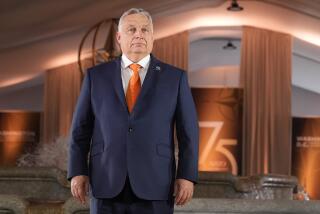Clinton’s Task: Get Europe’s Youth in America’s Corner : Alliances: Alarm over Balkans aids him in wooing young people to keep old ties with U.S. Being liked helps.
- Share via
BRUSSELS — Beneath the carved panels and ornate Gothic parapets of Brussels’ Hotel de Ville, Bill Clinton on Sunday faced the first test of his first presidential trip to Europe: Could he persuade members of the Continent’s next generation to embrace the deep-rooted bonds with America on which their parents had so long relied?
An audience of accomplished young Europeans gathered in the daunting solemnity of the 15th-Century town hall studied him closely and clapped politely when Clinton told them that it was time “for us together to revitalize our partnership.”
But shortly afterward he got the warmer reaction he had been seeking when he ventured outside into the chilled, charged atmosphere of the historic Grand’ Place. Jammed amid the worn facades of guild buildings from a prosperous era four centuries ago, the Belgians cheered.
“Bill! Bill!” they cried, waving tiny American flags to capture the eye of the flush-faced American President.
From the looks of them, it was clear that Clinton has a chance to win the support he is seeking. He has it because of the alarming new world the youth of Europe are seeing in the former Yugoslav federation and further east, and because of the surprisingly good impressions they have formed of the youngest American President in three decades.
American leaders, and the young people’s own parents, have long worried about the youth of postwar Europe. Would they take seriously the dangers of war that led their parents to build a long-term bond with the powerful nation across the Atlantic?
Western governments have conducted studies and sifted polls, and seemed to reach a worrisome conclusion: This “new generation” is not as concerned about future security threats as those who had seen the terrible devastation wrought by two world wars.
The leaders of their parents’ generations, still in power in many European governments, knew those horrors firsthand. It colored their view of their own military needs, and of America’s value to them. German Chancellor Helmut Kohl talks of receiving a coat in an American Care package; French President Francois Mitterrand escaped from a German prisoner-of-war camp.
The postwar generation has seen a different America. Not many of those who braved the chill of a January night in Brussels would be able to identify Gen. George Marshall, the American whose multibillion-dollar plan of relief and reconstruction helped rebuild their continent.
But they know the America of Michael Jordan, of Nike shoes, of the American films whose ads are plastered on billboards throughout their capital city. This has been a culture that they drink in, but do not always admire. To young Europeans, America is also the country of crime, drugs and homelessness--of urban contagions they fear are spreading to their own nations.
For many, their first impressions of the country came during the years of the Vietnam War. Many in Europe considered the United States an imperialist power, a muscle-bound nuclear bully that showed the same moral blindness of the Soviets it opposed.
Curiously, with the end of the Cold War that many young Europeans believed brought out America’s worst side, a new perception of America has thrived.
With the disintegration of the Yugoslav federation, many have seen their own continent engulfed by a Vietnam of its own, an all-consuming war that mocks them from television every night. As they watch the collapse of buildings and the burial of civilians, they lament a war their governments seem powerless to stop.
Yes, Europeans have faulted the Clinton Administration for its failed efforts to stop the three-way slaughter. But their anger and frustration at the Americans over Bosnia-Herzegovina have been directed more at Secretary of State Warren Christopher than at Clinton, and in any case are exceeded by their unhappiness with their own leadership.
Beyond this, the Continent’s new generation has shown a special personal affinity for the new President, so far at least. Clinton’s attempts to identify himself with John F. Kennedy may seem contrived to some Americans, but polls show Europeans like the vitality of the 47-year-old Arkansan that reminds them of the Democrat who was their favorite postwar President.
Still, during his first European outing as President, Clinton did not, perhaps, work as hard as he might have at exuding charm.
After his speech inside the town hall, he made his way to a podium outside to meet a crowd that had been gathering for hours. But he cut short his comments, smiling genially as he told the group: “You’ve heard my speech, I have really nothing else to say.”
And the young Europeans in the Grand’ Place were not overawed by Clinton’s lieutenants. The crowd tittered, then burst out laughing, when the oversized TV screen erected in the square to show Clinton’s speech panned on his overworked secretary of state, his eyes pressed closed, apparently dozing.
“ Il dort (He’s asleep),” a long-haired Belgian youth snickered.
But the reviews of Clinton’s speech struck a different tone. German television, for one, was soon lavishing praise on Clinton for his expressions of concern about the U.S.-European relationship.
The same reaction was apparent even as Clinton glided to his waiting limousine.
“He’s very nice looking,” said Natasha Cleti, 24, who works in an art gallery just off the Grand’ Place. “He’s very positive and very friendly.”
“Bill!” cried a young woman in a tricolored jersey apparently made from an American flag. “Come hold our hands!”
More to Read
Get the L.A. Times Politics newsletter
Deeply reported insights into legislation, politics and policy from Sacramento, Washington and beyond. In your inbox three times per week.
You may occasionally receive promotional content from the Los Angeles Times.











